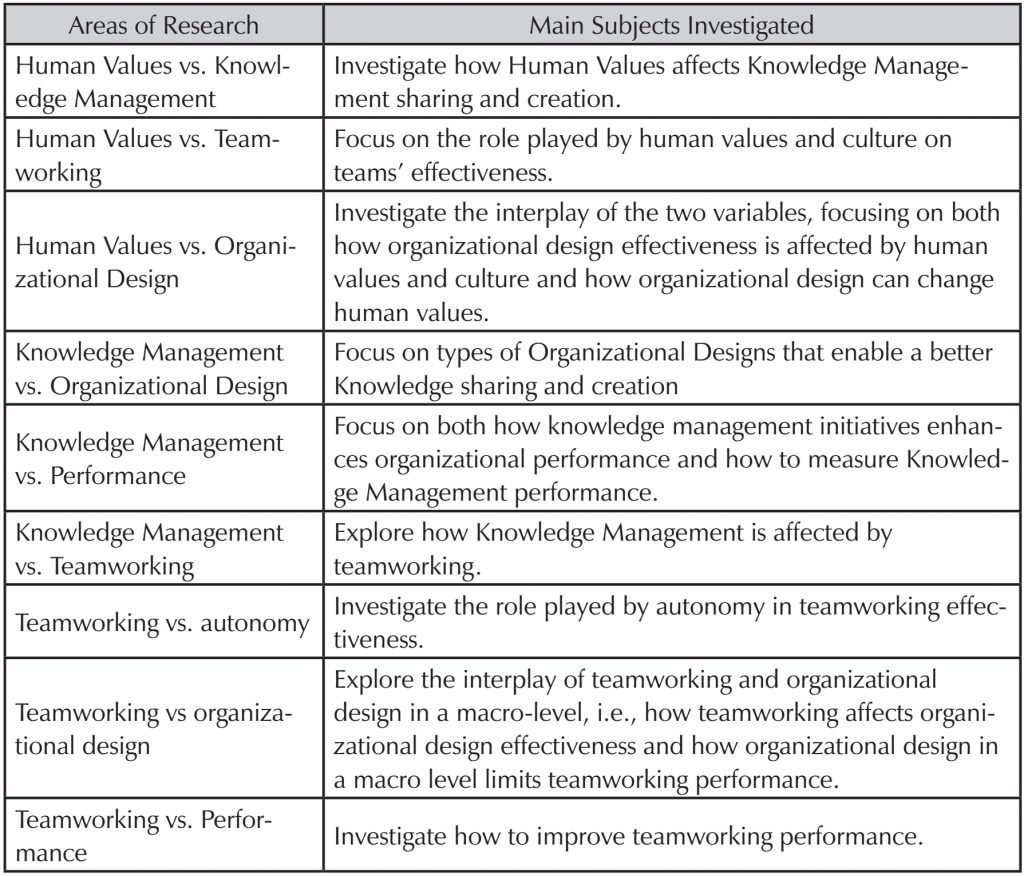
The interplay of individual values, team work, and knowledge management
Work teams are one of the most popular types of teams, and research shows that knowledge creation and sharing are closely related to the effectiveness of work teams in an industrial shop floor context. Work teams are typically led by a supervisor who makes most of the decisions, however many researchers have found that greater autonomy for team members is a key driver of successful knowledge management. Some studies propose that the extent to which greater team member autonomy contributes to better knowledge management depends on the values or level of consciousness of team members.
Given the interplay of these three variables – teamwork, knowledge management, and human values – a recent systematic literature review1 sets out to answer the following question: “How does human values, teamworking and knowledge management interrelate with each other on the industrial shop floor?”
What did the review find? In short, nothing that could answer that question: “there was no paper focusing on how human values impact on teamworking design and management in order to maximize knowledge management on the industrial shop floor.” The authors recommend that this important literature gap be explored in future research.
However, the review turned up a range of literature addressing interplays of pairs of the three variables: how human values affect teams and their performance, the interplay of human values and knowledge management, and the interplay of organizational and teams design and knowledge management and sharing. Many of the reviewed papers also focused on the impacts knowledge sharing and management have on organizational performance.
The systematic literature review involved an eight-step process. A keyword search of research databases was conducted, and then the identified papers were filtered and categorized. Papers focusing primarily on knowledge management were divided into the four categories of performance, human values, organizational design, and teamworking. Papers focusing primarily on teamworking were divided into the five categories of performance, knowledge management, organizational design, autonomy, and human values. Papers focusing primarily on human values were divided into the three categories of organization design, knowledge management, and teamworking.
Looking across the categories under each of the three variables and then removing redundancies reveals nine main areas of research that can be defined in the interplay of the three variables, as shown in Table 1.

Insights from the papers reviewed
- Individual consciousness levels impact knowledge sharing performance.
- Values influence people’s commitment in organizations, and human values are influenced by national culture.
- Cultural values affects human values, which in consequence, affects teamworking.
- One study described an increase of commitment and productivity when people experienced autonomy, but another found that there is no statistically significant difference between the predicted gains from autonomous against non-autonomous teams. This conflict suggests that something might be modulating these two variables, inhibiting a direct causal relationship between team autonomy and team performance.
- Intrinsic and extrinsic motivation influences workers’ intention to share knowledge, but also, results and job oriented cultures have positive impacts on employee’s intention in the knowledge management process.
- Some studies showed the importance of a trust environment in order for workers to want to share their knowledge and their own experiences with their teams.
- A strong positive relationship was found between trust and knowledge sharing for all types of teams, but the relationship was stronger when task interdependence was low, supporting the position that trust is more critical than autonomy as a driver of knowledge sharing and creation.
- Worker’s lack of consciousness may negatively affect their intention to share knowledge, consequently leading to weak decision-making and communication in organizations. It also limits the organization in some aspects such as innovation and risk management. This implies that more complex levels of consciousness and values are needed to cope with the volatility, uncertainty, complexity, and ambiguity that is increasingly typical of the new industrial environment.
Reference:
- de Assis Bastos, F. A. D., & de Mello Cordeiro, J. V. B. (2016). Individual Values, Teamworking and Knowledge Management – A Systematic Literature Review. Caderno PAIC, 17(1), 129-139. ↩
Also published on Medium.





